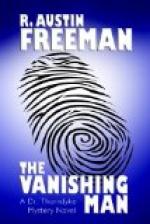“Had he, so far as you know, any reasons for wishing to disappear?”
“No.”
“When and where did you last see him alive?”
“At six o’clock in the evening, on the fourteenth of October, nineteen hundred and two, at 141 Queen Square, Bloomsbury.”
“Kindly tell us what happened on that occasion.”
“The testator had called for me at my office at a quarter past three, and asked me to come with him to his house to meet Doctor Norbury. I accompanied him to 141 Queen Square, and shortly after we arrived Doctor Norbury came to look at some antiquities that the testator proposed to give to the British Museum. The gift consisted of a mummy with the four Canopic jars and other tomb-furniture, which the testator stipulated should be exhibited together in a single case and in the state in which they were then presented. Of these objects, the mummy only was ready for inspection. The tomb-furniture had not yet arrived in England, but was expected within a week. Doctor Norbury accepted the gift on behalf of the Museum, but could not take possession of the objects until he had communicated with the Director and obtained his formal authority. The testator accordingly gave me certain instructions concerning the delivery of the gift, as he was leaving England that evening.”
“Are those instructions relevant to the subject of this inquiry?”
“I think they are. The testator was going to Paris, and perhaps from thence to Vienna. He instructed me to receive and unpack the tomb-furniture on its arrival, and to store it, with the mummy, in a particular room, where it was to remain for three weeks. If he returned within that time he was to hand it over in person to the Museum authorities; if he had not returned within that time, he desired me to notify the Museum authorities that they were at liberty to take possession of and remove the collection at their convenience. From these instructions I gathered that the testator was uncertain as to the length of his absence from England and the extent of his journey.”
“Did he state precisely where he was going?”
“No. He said that he was going to Paris and perhaps to Vienna, but he gave no particulars and I asked for none.”
“Do you, in fact, know where he went?”
“No. He left the house at six o’clock wearing a long, heavy overcoat and carrying a suit-case and an umbrella. I wished him ‘Good-bye’ at the door and watched him walk away as if going towards Southampton Row. I have no idea where he went, and I never saw him again.”
“Had he no other luggage than the suit-case?”
“I do not know, but I believe not. He was accustomed to travel with the bare necessaries, and to buy anything further that he wanted en route.”
“Did he say nothing to the servants as to the probable date of his return?”
“There were no servants excepting the caretaker. The house was not used for residential purposes. The testator slept and took his meals at his club, though he kept his clothes at the house.”




